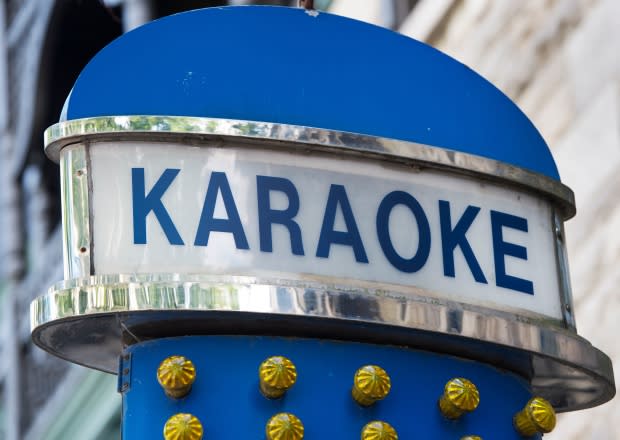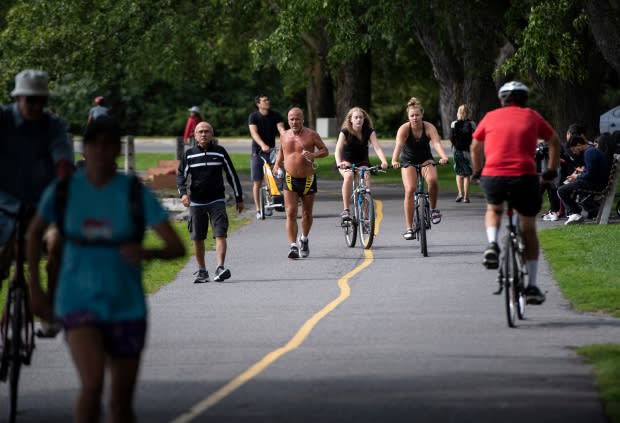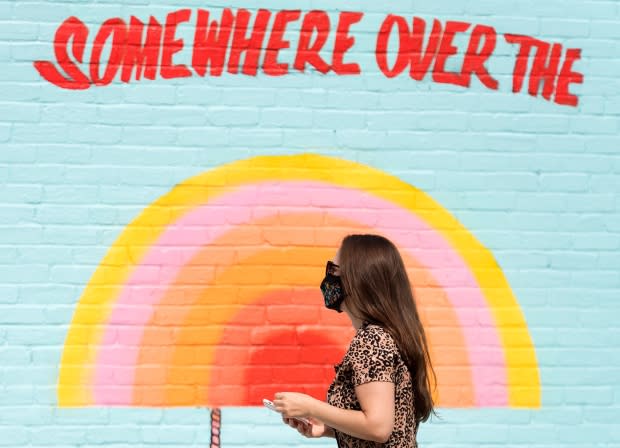What you need to know about COVID-19 in Ottawa on Saturday, Sept. 12

Recent developments:
Public health officials confirmed another 27 cases of COVID-19 in Ottawa on Saturday.
Employees at two of the city's long-term care homes, the Peter D. Clark Centre and Centre d'accueil Champlain, have tested positive for COVID-19. The two individuals are in self-isolation, and outbreaks have been declared at both homes.
Police in Quebec can now start fining people for not wearing masks at indoor public places.
What's the latest?
Starting Saturday, police in Quebec will be able to fine people for not wearing masks in indoor public places. Gatineau police are asking residents not to call 911 to report a violation, but rather to call their tip line at 819-246-0222.
Harmony House, an Ottawa women's shelter, has set up a makeshift classroom for children there so they can be home-schooled together. So far, five students are signed up.
Another 27 cases of COVID-19 were confirmed in Ottawa Saturday afternoon, according to public health officials.
The majority of the new cases — 19 out of the 27 — were in people under the age of 30.
On Friday, the Ottawa Student Transportation Authority (OSTA) released a list of school bus route cancellations that will be updated on an ongoing basis.
OSTA says 2,360 students will have no bus to school Monday when the city's English-language boards resume classes.
How many cases are there?
Testing has confirmed 3,227 people in Ottawa have had COVID-19. Of those, 268 remain active cases and 2,692 are considered resolved. Two-hundred and sixty-seven deaths in Ottawa have been linked to the respiratory illness.
Overall, public health officials have reported nearly 5,000 people with COVID-19 across eastern Ontario and western Quebec, with more than 4,200 of them considered resolved.
COVID-19 has killed 104 people in the region outside Ottawa: 52 people have died in Leeds, Grenville and Lanark counties, 34 in the Outaouais and 18 in other parts of eastern Ontario.
What's open and closed?
Every local school board or service centre has started bringing students back. All classes should have started by Sept. 18, with some First Nations schools starting later.
Ontario is in Stage 3 of its reopening plan, which means more businesses are open and indoor gatherings of up to 50 people and outdoor gatherings of up to 100 are now allowed under physical distancing guidelines.

There won't be any further loosening of rules until at least Oct. 6 because of the concerning upward trend in its numbers.
Premier Doug Ford said this week he'd like any stricter rule changes to be done by local officials, not the province.
Kingston, Ont., has tightened its distancing rules in city parks.
PR Transpo transit service in Prescott-Russell resumes Monday.
Quebec has similar reopening rules to Ontario, with its cap on physically distanced gatherings in public venues now up to 250 people, allowing smaller festivals.
Distancing and isolating
The novel coronavirus primarily spreads through droplets when an infected person coughs, sneezes, breathes or speaks onto someone or something.
People don't need to have symptoms to be contagious.
That means physical distancing measures such as working from home, meeting others outdoors as much as possible and keeping distance from anyone you don't live with or have in their circle, including when you have a mask on.

Masks are now mandatory in indoor public settings in all of eastern Ontario and Quebec, including transit services and taxis in some areas.
Masks are also recommended outdoors when you can't stay the proper distance from others.
Anyone who has travelled recently outside Canada must go straight home and stay there for 14 days.
In Ontario, that's the same period of self-isolation for anyone with symptoms. When self-isolating, only leave home or see other people if it's critically important, such as to go see a doctor.

Most people with a confirmed COVID-19 case in Quebec can end their self-isolation after 10 days if they have not had a fever for at least 48 hours and has had no other symptom for at least 24 hours.
Health Canada recommends older adults and people with underlying medical conditions and/or weakened immune systems stay home as much as possible.
What are the symptoms of COVID-19?
COVID-19 can range from a cold-like illness to a severe lung infection, with common symptoms including fever, a cough, vomiting and the loss of taste or smell.
Less common symptoms include chills, headaches and pinkeye. Children can develop a rash.
People should not get tested any sooner than five days after potential exposure, since it takes about that long for the virus to grow to be detectable by a test, said Ottawa's medical officer of health Vera Etches in early September.
If you have severe symptoms, call 911.
Where to get tested
In eastern Ontario:
In Ottawa any resident who feels they need a test, even if they are not showing symptoms, can be tested at one of four sites — including a new drive-thru testing centre.

Inuit in Ottawa can call the Akausivik Inuit Family Health Team at 613-740-0999 for service, including testing, in Inuktitut or English on weekdays.
There's also a mobile testing van operated by Inner City Health that mostly serves people experiencing homelessness and some tests done in hospitals.
In the Eastern Ontario Health Unit, there is a drive-thru centre in Casselman and assessment centres in Hawkesbury and Winchester that don't require people to call ahead.
Others in Alexandria, Rockland and Cornwall require an appointment.
In Kingston, the Leon's Centre is hosting the city's test site though Gate 2.
Napanee's test centre is open daily for people who call ahead.
You can arrange a test in Bancroft, Belleville or Trenton by calling the centre and in Picton by texting or calling. Only Belleville and Trenton run seven days a week.
The Leeds, Grenville and Lanark unit asks you to get tested if you have a symptom or concerns about exposure.
It has a walk-in site in Brockville at the Memorial Centre and testing sites in Smiths Falls and Almonte which require an appointment.
Renfrew County residents should call their family doctor and those without access to a family doctor can call 1-844-727-6404 to register for a test or if they have health questions, COVID-19-related or not.
It's testing in six communities this week with an appointment.
In western Quebec:
Outaouais residents now can get a walk-in test in Gatineau seven days a week at 135 blvd. Saint-Raymond.
There are recurring clinics by appointment in communities such as Gracefield, Val-des-Monts and Fort-Coulonge.
They can call 1-877-644-4545 to make an appointment or if they have other questions.
First Nations:
Akwesasne has had 14 confirmed COVID-19 cases, most linked to a gathering on an island in July.
It has a mobile COVID-19 test site available by appointment only. Anyone returning to the community on the Canadian side of the international border who's been farther than 160 kilometres away — or visited Montreal — for non-essential reasons is asked to self-isolate for 14 days.
In early September, it expanded its gathering limit to 50 people. Its schools start bringing students back the week of Sept. 21.
Anyone in Tyendinaga who's interested in a test can call 613-967-3603 to talk to a nurse. Its office and well-being centre will be open by appointment, with bookings starting Monday.
People in Pikwakanagan can book an appointment for a COVID-19 test by calling 613-625-2259.
Kitigan Zibi's fitness centre and playground park are opening up with restrictions..
For more information

